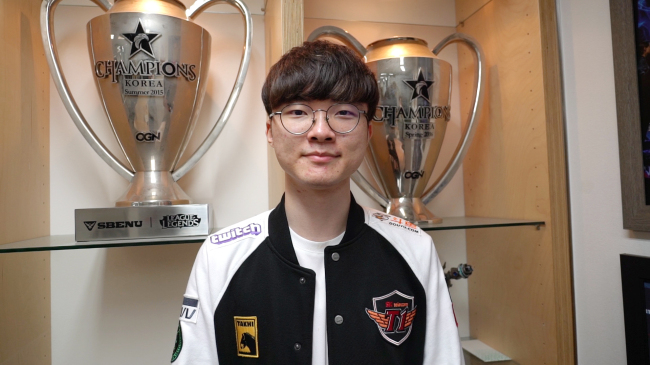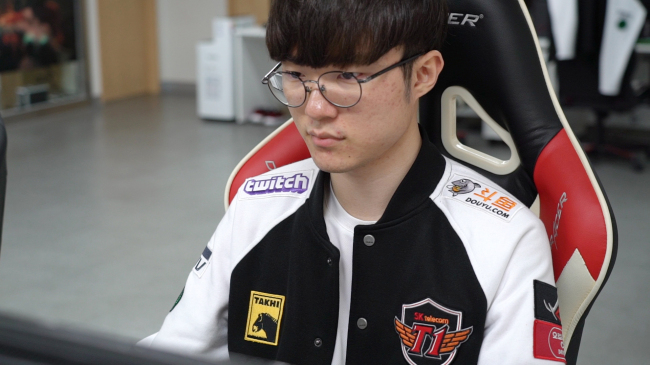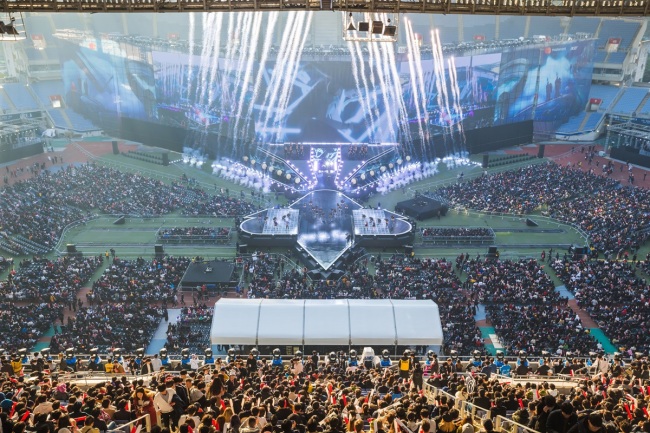[Herald Interview] Meet 'Faker': Korean League of Legends talent extraordinaire
Pro gamer Lee Sang-hyeok talks about fame, future of esports and public perceptions toward gaming
By Sohn Ji-youngPublished : Nov. 8, 2018 - 16:37
ILSAN, Gyeonggi Province -- In simplistic attire and with a quiet demeanor, Lee Sang-hyeok seems no different from any other young Asian guy. But when he walks down the streets of Seoul, heads turn and cheers can be heard. His fame reaches far and wide -- from Korea and China to North America and Europe.
Meet Lee, aka “Faker,” an undisputed superstar in the world of competitive gaming, or esports. Born and raised in South Korea, the 22-year-old is considered among the top echelon of players in multiplayer online battle arena PC game “League of Legends,” released by US video game company Riot Games in 2009.
Meet Lee, aka “Faker,” an undisputed superstar in the world of competitive gaming, or esports. Born and raised in South Korea, the 22-year-old is considered among the top echelon of players in multiplayer online battle arena PC game “League of Legends,” released by US video game company Riot Games in 2009.
“LoL” for short, “League of Legends” blends elements of quick, strategic thinking and coordinated teamwork, as five players cooperate to crush their opponents’ base. And the game holds the biggest presence in the esports market that is expected to exceed $900 million this year, according to market intelligence firm Newzoo.
While “LoL” has other stars, Faker, a mid-laner for the SK Telecom T1 team, remains exceptional.
After going professional at the age of 17 in 2013, the Korean esports star led his team to sweep three consecutive world championship titles in “LoL,” a track record that earned him a reputation as the “God” or “Michael Jordan” of “LoL.”
But Lee does not think of himself as a prodigy. He liked playing games of all genres even as a kindergartener. And through the successive years spent on games, he was able to develop a sort of “gaming sensibility” he believes is innate in any pro gamer.
His track record has also seen him rewarded well financially.

Faker’s annual wages are now estimated at over 3 billion won ($2.67 million), or as high as 5 billion won with incentives, making him perhaps the highest earner in the industry.
Despite his solid performances, Lee appeared to have hit a slump this year, as SKT T1 performed far below expectations and failed to even qualify for this year’s World Championship, drawing both disappointment and surprise from fans.
Returning from a brief offseason vacation, the “LoL” superstar says he is ready to get back into the game next year, as his passion and dedication to the PC game remains as strong as ever.
“Watching this year’s ‘LoL’ World Championship Finals take place in Korea, I really came to feel that I have to perform better during next year’s season.” Lee told The Korea Herald in a recent interview at SKT T1’s training facility in Ilsan, Gyeonggi Province.
“More specifically, I hope to deliver a performance that’s at least commensurate to our (winning) record from last year or the years prior. I think we’ll need to win a lot next year, to make up for losses sustained this year.”

Though it is seldom a chore for Lee to playing, he said such moments did come at times throughout 2018 as his team continued to pile on losses. As for why, he said his emotions seems to have affected his concentration and gameplay this season.
Despite what some say could signal the start of a slump in his career, Lee is confident he can climb back to the top of the global “LoL” league through rigorous training and intuition combined with the experience-based know-how he has attained over the past six years as a professional.
For Faker, breaks or quitting are not an option.
Retirement -- the age ceiling for pro gamers is typically around 27 -- is something he rarely thinks about, though he did acknowledge, with a laugh, that he has enough savings to warrant an early retirement.
“I want to keep on until I’m 27, or even older. And I am confident that I can continue to do so until that age, or even beyond that point,” Lee said.
Secret formula for success
Aside from the respect he has earned with his outstanding gameplay, the “LoL” superstar draws a greater spotlight from fans and the public particularly because of his humble persona, discipline and an ascetic lifestyle.
Granted, Lee, like many pro gamers, spends 10 to 12 hours a day practicing “LoL,” leaving little time to do much else. But even in his free time, he does little beside catching up on lost sleep and reading books sent by his fans.
The gamer spent his latest weeklong vacation entirely at home with family, sleeping 12 hours a day, reading books and occasionally playing longtime PC game of choice “StarCraft” -- his second-favorite game after “LoL,” he said.
Though in his early 20s, Lee stays far away from many of the vices and pleasures many young people are attracted to -- or at least have tried -- be it splurging on expensive products, seeking out fine restaurants, drinking, smoking, trying a crazy hairstyle or keeping up with fashion trends.
Dating is also a distant possibility, as he spends most of his day practicing his craft. But if he were to meet a woman, the bespectacled player hopes it would be someone who is “not just pretty, but one he can form a mental connection with.”
In Lee’s view, his reserved personality helped him become a successful pro gamer who doesn’t lose focus, as well as an esports star who averts unnecessary gossip.
“I’ve always been more interested in playing games, rather than going out to play. I like sleeping more than meeting with friends. And I think such traits made me more fit for a life as a professional gamer,” Lee said.
“Moreover, I think pro gamers, like celebrities, are essentially public figures exposed to the masses. And the fact that I’m not the type to create unnecessary gossip is another advantage I have.”

But persona aside, exceptional gaming skills are what ultimately make Faker a world star in “LoL.” And “Why is Faker so good at ‘LoL?’” is a question fans, aspiring pro gamers, rival players and Lee himself has pondered over the past years.
Lee is still unsure why he is so good at “LoL.” Familiarity with video games from an early age, intuition, and the ability to make quick decisions in the spur of the moment have all contributed to Faker’s talents.
One thing the star player is sure of is that lots of experience and interest in games from a young age is almost a prerequisite for becoming a professional gamer.
“For instance, a soccer player who has consistently played the sport as a child is said to be more successful than someone who started soccer later in life. Under the same logic, I think a person who has been trying to be a better gamer from an early age is more likely to succeed, though it isn’t the only factor involved.”
But most importantly, he believes continuously thinking about what it is that you are good at and trying relentlessly and passionately to be better at that thing is crucial in excelling at any endeavor, including esports.
Does that mean effort trumps talent when it comes to succeeding as a professional gamer? Not necessarily, Lee said, adding that those interested in pursuing a career toward this end should take sufficient time to “objectively evaluate their skills.”
“Right now, there are so many people who want to become pro gamers, but the proportion of those who end up succeeding is extremely small,” Lee said.
“I won’t stop those who decide to pursue this path based on a realistic evaluation of their skills. But I do want to warn those who want to become a pro gamer just because they like video games to seriously consider their options and make wise decisions.”
Esports ambassador
With an illustrious career and global recognition, Faker has come to symbolize not only “LoL,” but the general esports culture and community. Many say that a superstar like Lee is needed to help esports become more mainstream and recognized worldwide.
He certainly felt the weight during the Asian Games in Jakarta this year, where esports was featured as a demonstration event. And “LoL” was one of six titles included in the regional competition.
“At the Asian Games, I felt a more diverse demographic of viewers were watching us. We definitely felt more pressure going into the matches,” Lee said. “But from all the newfound attention, I felt that more and more people were coming to accept and be interested in esports.”

Though the Korean team lost in the finals to take home silver at the Asian Games, Faker believes participation in the sporting event itself was successful in that it exposed esports to the general masses. And he is hopeful this progress will continue in the coming years.
“Looking ahead, I think that esports will definitely become an official sport at the Asian Games and even the Olympics in the future. I also think that even a bigger esports tournament could come down the road,” Lee said.
The “LoL” superstar also took time to discuss his thoughts on a major countertrend that could reset the progress made toward strengthening social acceptance of gaming: the World Health Organization’s move to recognize gaming addiction as a mental disorder.
“I think we’re facing a two-sided situation where support for gaming and esports is rapidly increasingly, while calls to medicalize gaming addiction as a mental illness is growing stronger,” Lee said.
“I think both side are right in their own ways. Because games are fun to play, they could cause (dangerous levels of) addiction more easily than any other sports could. I think the said problems must be corrected, while esports should continue to advance as it is. But I do realize that striking a balance is hard.”
The best thing he can do as a pro gamer is “to work hard, do well,” he said. “I hope we can contribute to shaping more positive perceptions of gaming and esports.”
By Sohn Ji-young (jys@heraldcorp.com)











![[Today’s K-pop] BTS pop-up event to come to Seoul](http://res.heraldm.com/phpwas/restmb_idxmake.php?idx=644&simg=/content/image/2024/04/17/20240417050734_0.jpg&u=)
![[Graphic News] More Koreans say they plan long-distance trips this year](http://res.heraldm.com/phpwas/restmb_idxmake.php?idx=644&simg=/content/image/2024/04/17/20240417050828_0.gif&u=)




![[KH Explains] Hyundai's full hybrid edge to pay off amid slow transition to pure EVs](http://res.heraldm.com/phpwas/restmb_idxmake.php?idx=652&simg=/content/image/2024/04/18/20240418050645_0.jpg&u=20240419100350)

